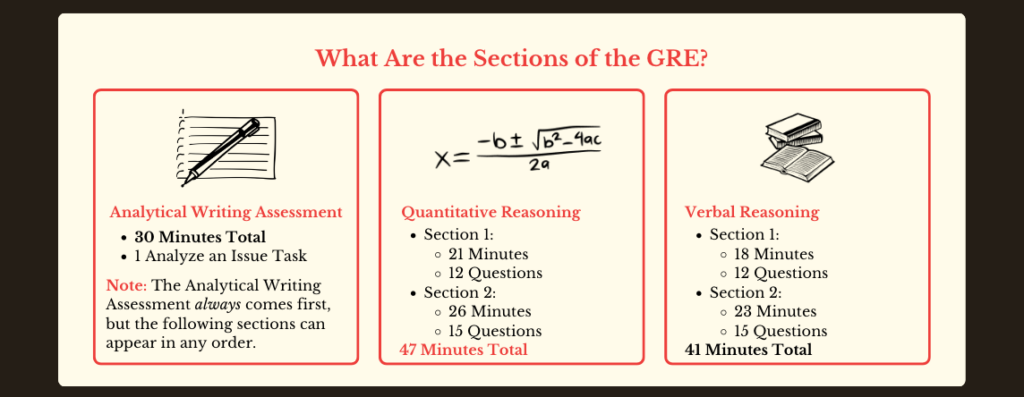The Graduate Record Examination (GRE) is a multiple-choice, standardized exam. It is used by graduate schools—including business schools—for evaluating applicants’ preparedness for graduate-level academic work and comparing applicants’ qualifications.
The GRE general test contains questions that measure the test-taker’s understanding of basic arithmetic, algebra, geometry, data analysis, and advanced vocabulary.
Test-takers must think critically and solve complex problems to excel on the GRE. There are also GRE subject tests for certain fields of study.
There are five total sections of the GRE:
Altogether, the GRE takes approximately 1 hour and 58 minutes to complete.

Each section of the GRE is designed to evaluate another facet of an individual’s critical- and abstract-thinking and problem-solving skills, in order to determine their preparedness for graduate school admissions.
GRE scores are very important for many graduate programs globally, contributing significantly to an applicant’s candidacy. In many cases, a good GRE score can mean the difference between an applicant’s acceptance and rejection from their target grad school.
Achieving a high GRE score illustrates your abilities in critical and abstract thinking, as well your problem-solving abilities, time-management skills, and your determination to succeed both in the classroom and beyond.
Most graduate program applicants study for the GRE for up to 12 weeks, either alone, through prep courses, through tutoring, or a combination of all three.
Test takers receive three separate scores after taking the graduate record exam: a verbal score, a quantitative score, and an analytical writing score.
The verbal and quantitative sections are scored from 130 to 170 measured in one point increments, and the analytical writing section is scored from 0 to 6, measured in half-point increments.
The mean verbal score is 151, with 160 being in the top 10%. The mean quant score is 153, with the top 10% earning more than 166. The average GRE score overall is about 300. Finally, the mean analytical writing score is 4.0.
Depending on your career path, the GRE could be an important milestone in your academic journey, or it could be an unnecessary diversion.
For MBA candidates, it is advisable to take the GMAT over the GRE unless you have exhausted the possibility of attaining a competitive GMAT score.
For humanities majors and certain other grad school candidates, the GRE will probably be an admissions requirement for your target program.
Before you take the GRE, make sure that you’ve established a thorough study plan, you understand the format of the exam as well as the score you should aim to achieve, and you’ve given yourself enough time to achieve a competitive result before your program deadline.
Ready to take your GRE preparation to the next level? Our skilled online tutoring for GRE provides targeted assistance to address your specific needs and maximize your potential on the exam.